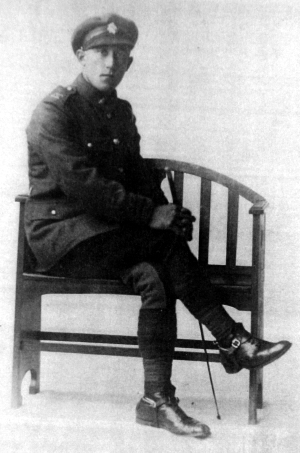
Clifford Walker was born in Ossett in 1898, the son of John Walker and his wife Annie Ada (nee Hall), who had married in late 1894 in the Dewsbury Registration District. In 1891, before his marriage, John Walker was working as an insurance agent and living with his parents in Horbury. By 1901, Clifford was living with his parents, 33 year old John Walker and 32 year old Annie Ada together with his sister Marian (born 1896). They are living on Intake Lane (near Sunnydale) and John Walker is now working as a rag merchant. The Walker family moved to live at Bleak Cottage, Manor Road, Ossett some time before 1915 and John Walker was a rag merchant with premises in Town End, Ossett.
The unsung heroes of the British army in the Great War, the Army Service Corps (A.S.C) were nicknamed “Ally Sloper’s Cavalry” by a WW1 music hall star, after a fictional comic-strip character. Because of their good pay, comfortable conditions and comparative safety, frontline troops didn’t regard them as proper soldiers. However, soldiers cannot fight without food, equipment and ammunition. In the Great War, the vast majority of this tonnage, supplying a vast army on many fronts, was supplied from Britain. Using horsed and motor vehicles, railways and waterways, the A.S.C. performed prodigious feats of logistics and were one of the great strengths of organisation by which the war was won.
At the time of his death, Clifford Walker was attached to the Remounts Service of the Army Service Corps. The A.S.C. Remounts Service was responsible for the provisioning of horses and mules to all other army units. It was not a large part of the ASC, despite the huge numbers of animals produced, amounting in 1914 to only four Remount Squadrons that ran four Remount Depots (Woolwich, Dublin, Melton Mowbray and Arborfield).
A Remount Squadron consisted of approximately 200 soldiers, who obtained and trained 500 horses. They were generally older, experienced soldiers. Animals were obtained during the war by compulsory purchase in the United Kingdom and by purchasing from North and South America, New Zealand, Spain, Portugal, India and China.
As the army expanded, several more ASC Remount Squadrons were established at home and overseas. There were six A.S.C. Remount Depots in France, including one at Rouen, the No. 1 Base Remount Depot, which is probably where Clifford Walker served before his death. A Base Remount Depot (with capacity for 2,600 animals) and two Advanced Remount Depots (300 each) went to France with the original British Expeditionary Force. As the campaign continued, further Base Remount Depots opened at the base ports. At the peak in December 1917, these facilities were training a total of 93,847 horses and 36,613 mules.
Clifford Walker was not killed in action, but died of influenza, most likely from the flu pandemic (Spanish flu) that was sweeping Europe at the time and, it is said, killed more than double the number of those killed in WW1. The disease was first observed in the USA in March 1918 and by August 1918 a particularly virulent strain was identified in Northern France.
The “Ossett Observer” 1 carries the following report about Private Walker’s unfortunate death just six days before the end of the WW1:
“Private Clifford Walker (21), only son of Mr. John Walker of Bleak Cottage, Manor Road, South Ossett, died on the 5th November 1918 in hospital in Rouen, France from influenza. Deceased who was a scholar of the Wesley Street, Wesleyan Sunday School and actively associated with the Temperance Hall enlisted in the KOYLI two years ago, but has latterly been attached to the Army Services Corps, remount department. He had previously suffered from pneumonia whilst in the army.”
Private Clifford Walker died on the 5th November 1918 at the age of 21 years and is buried at grave reference S. II. Y. 18. at the St. Sever Cemetery Extension, Rouen, 2 Seine-Maritime, France. St Sever Cemetery and St. Sever Cemetery Extension are located within a large communal cemetery situated on the eastern edge of the southern Rouen suburbs of Le Grand Quevilly and Le Petit Quevilly.
During the First World War, Commonwealth camps and hospitals were stationed on the southern outskirts of Rouen. A base supply depot and the 3rd Echelon of General Headquarters were also established in the city.
Almost all of the hospitals at Rouen remained there for practically the whole of the war. They included eight general, five stationary, one British Red Cross and one labour hospital, and No. 2 Convalescent Depot. A number of the dead from these hospitals were buried in other cemeteries, but the great majority were taken to the city cemetery of St. Sever. In September 1916, it was found necessary to begin an extension, where the last burial took place in April 1920.
During the Second World War, Rouen was again a hospital centre and the extension was used once more for the burial of Commonwealth servicemen, many of whom died as prisoners of war during the German occupation.
The cemetery extension contains 8,348 Commonwealth burials of the First World War (ten of them unidentified) and in Block “S” there are 328 from the Second World War (18 of them unidentified). There are also 8 Foreign National burials here.
References:
1. “Ossett Observer”, 16th November 1918